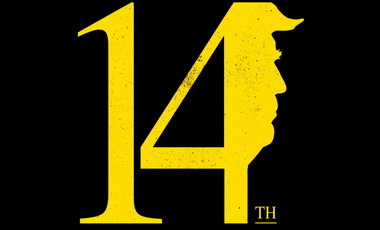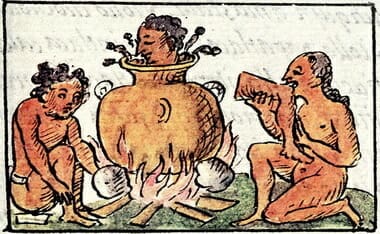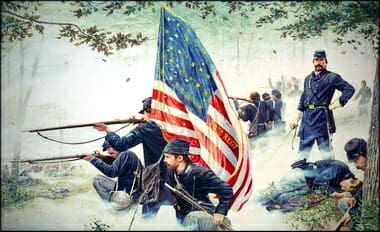This old challenge reignited “anew” by a couple Federalist legal scholars [as well as some Leftist scholars] is that Trump can be barred from future office positions due to “insurrection.”
This will be a thing.
THE CHALLENGE EXPLAINED A BIT
- Two Federalist Society law professors have published their findings stating that Trump is disqualified from serving as President based on the originalist interpretation of the 14th amendment ban on anyone who has engaged in insurrection against the United States from running for office. (MTN)
- Donald Trump is ineligible to become president again, leading conservative scholars argue. “The Fourteenth Amendment, Section 3 says that anybody who takes an oath to uphold the Constitution and thereafter engages in or gives aid and comfort to an insurrection cannot hold any office under the United States, period,” Harvard University Carl M. Loeb University Professor of Constitutional Law Emeritus Laurence Tribe tells Joy Reid. (YAHOO NEWS)
Firstly, as much as the Left opines that an insurrection conviction isn’t needed, it is, in reality, in order to bar Trump from office. If the Left tries to push this thru without a solid legal ground, the electorate will clearly note this and there will be hell to pay.
And, I assume, in the end the Supes will need to get involved. Especially if pushed thru before the election like Trump’s 2nd shampeachment.
More on SCOTUS from David Frum below.
COURT CASE ALREADY STARTED
Here is a recent news story of a Florida case already being pushed thru:
A Florida lawyer is challenging former President Trump’s ability to run for president in 2024 under the U.S. Constitution’s 14th Amendment, citing the Jan. 6, 2021, Capitol attack.
Lawrence Caplan, a tax attorney in Palm Beach County, filed the challenge in federal court Thursday, pointing to a clause in the amendment that says those who “have engaged in insurrection or rebellion” against the government cannot hold office.
Here is a video, also Left leaning, explaining the issue well:
- MeidasTouch host Ben Meiselas reports on a new disqualification lawsuit filed against Donald Trump in Florida federal court under the 14th Amendment Section 3.
PUSHING BACK ON THIS IDEA
[As an aside: just to note officially on my site, the current cases against Trump are being rushed through the courts, however, Alan Dershowitz and Jonathan Turley both say isn’t going to happen.]
THE FEDERALIST has this response to a recent 126-page paper on Trump not being eligible for the Presidency:
….Despite the scenes of the attack on the Capitol and extensive investigations, the American people do not seem to agree that Trump took part in an insurrection or rebellion. Almost half the respondents in a THE HILL rejected the claim that the events of Jan. 6 were an actual “insurrection” (with the divide tracking partisan lines), and 76 percent viewed it as a “protest gone too far.”
Other considerations also call into question the claim that Trump instigated an “insurrection” in the constitutional sense. If it were clear that Trump engaged in insurrection, the Justice Department should have acted on the Jan. 6 Committee’s referral for prosecution on that charge. Special Counsel Jack Smith should have indicted him for insurrection or seditious conspiracy, which remain federal crimes. If it were obvious that Trump had committed insurrection, Congress should have convicted him in the two weeks between Jan. 6 and Inauguration Day. Instead, the House impeached Trump for indictment to insurrection but the Senate acquitted him.
The Senate’s acquittal is the only official finding by a federal or state institution on the question of whether Trump committed insurrection. The failure of the special counsel to charge insurrection and the Senate to convict in the second impeachment highlights a serious flaw in the academic theory of disqualification.
According to Luttig and Tribe, it appears self-evident that Trump committed insurrection. They assume Trump violated the law without any definitive finding by any federal authority. According to their view, he must carry the burden of proof to show he is not guilty of insurrection or rebellion — a process that achieves the very opposite of our Constitution’s guarantee of due process, which, it so happens, is not just provided for by the Fifth Amendment, but reaffirmed in the same 14th Amendment that contains the disqualification clause. It would be like requiring Barak Obama to prove he was native-born (a constitutional prerequisite for being president) if state election officials disqualified him for being foreign-born.
The Electoral College Chooses Presidents, Not State Officials
If this academic view were correct, it would throw our electoral system into chaos. One of the chief virtues of the Electoral College system is that it decentralizes the selection of the president: State legislatures decide the manner for choosing electors, with each state receiving votes equal to its representation in the House and Senate. States run the elections, which means that hundreds, if not thousands, of city, county, and state officials could execute this unilateral finding of insurrection. A county state election official, for example, could choose to remove Trump’s name from printed ballots or refuse to count any votes in his favor. A state court could order Trump barred from the election. A state governor could refuse to certify any electoral votes in his favor. The decentralization of our electoral system could allow a single official, especially from a battleground state, to sway the outcome of a close race in the 2024 presidential election.
Allowing a single state to wield this much power over the federal government runs counter to broader federalism principles articulated by the Supreme Court. In our nation’s most important decision on the balance of power between the national government and the states, McCullough v. Maryland, Chief Justice John Marshall held that a single state could not impose a tax on the Bank of the United States. Marshall famously observed that “the power to tax is the power to destroy.”
Marshall may well have frowned upon single state officials deciding to eliminate candidates for federal office on their own initiative. The Supreme Court lent further support for this idea in United States Term Limits v. Thornton (1995), which held that states could not effectively add new qualifications for congressional candidates by barring long-time incumbents from appearing on the ballot. Writing for the majority, Justice Stevens argued that allowing states to add term limits as a qualification for their congressional elections conflicted with “the uniformity and national character [of Congress] that the framers sought to ensure.” Allowing state election officials to decide for themselves whether someone has incited or committed insurrection, without any meaningful trial or equivalent proceeding, would give states the ability to achieve what term limits forbid.
[….]
We are not apologists for Trump’s spreading of baseless claims of electoral fraud or his efforts to stop the electoral count on Jan. 6. But as with the weak charges brought by the special counsel, the effort to hold Trump accountable for his actions should not depend on a warping of our constitutional system. Prosecutors should charge him with insurrection if they can prove it and have that conviction sustained on appeal. Congress should disqualify Trump if it can agree he committed the crime. Ultimately, the American people will decide Trump’s responsibility for the events of Jan. 6, but at the ballot box in 2024’s nominating and general elections for president…
TRUMP NOT CHARGED with INSURRECTION
Insurrection is still key in this endeavor, and, as mush as Laurence Tribe thinks it is self evident, the case has not been made. In THE AMERICAN SPECTATOR has a great little article worthy of noting,
For 31 months, the Democrats and their allies in the corporate media have characterized the Capitol Hill chaos that erupted on Jan. 6, 2021 as an “insurrection.” The House of Representatives reinforced this version of events by impeaching then-President Trump for “incitement of insurrection.” The Senate acquitted him, of course. Nonetheless, the House Select Committee to Investigate the January 6th attack referred the case to the Justice Department for further investigation. Consequently, it was something of a surprise that the formal indictment unsealed last Tuesday by Special Counsel Jack Smith failed to charge Trump with fomenting insurrection.
This must have been particularly frustrating for those who have long insisted that the 14th Amendment prohibits Trump from serving a second presidential term. The primary purpose of the 14th Amendment was, of course, to grant citizenship to emancipated slaves. However, it also includes language in Section 3 that bars anyone who has “engaged in insurrection or rebellion against the [United States]” from holding office in the federal government. This passage was included to prevent former officials of the Confederacy from returning to Congress and creating more mischief. The problem with using this clause against Donald Trump is explained by constitutional law professor Josh Blackman in Reason:
In some legal circles, advocates contend that it is so obvious that Trump committed insurrection. Yet, the special counsel, after studying the issue for months, opted not to bring that charge. Why? Perhaps Smith determined that he could not prove beyond a reasonable doubt that Trump engaged in insurrection. Or maybe Smith determined there were considerable legal questions about how to obtain such a conviction – most critically, was there an actual insurrection? (Yes, for the Supreme Court to knock Trump off the ballot, you need five votes to say that there was an insurrection as a matter of law – good luck with that!)
It evidently never occurred to the victims of Trump Derangement Syndrome that “insurrection” is a legal term with an actual definition in the U.S. Code. In order to convict former President Trump of this crime, the Special Prosecutor must prove that he fits the following description in 18 U.S.C. § 2383: “Whoever incites, sets on foot, assists, or engages in any rebellion or insurrection against the authority of the United States or the laws thereof, or gives aid or comfort thereto.” Anyone convicted of insurrection can expect a long prison term and a hefty fine. It would be difficult to convict Trump under this statute, considering that not one participant in the Jan. 6 riot has been charged with insurrection…..
DAVID FRUM’S ATLANTIC PIECE
And it may be a 50-state attempt, which will push it to the Supes sooner rather than later. David Frum, a #NeverTrump guy, notes this will be a failed endeavor by simply stating in his ATLANTIC piece:
- “The fourteenth amendment won’t save us from Donald Trump.”
Continuing he states:
….The least of these problems is the legal one: whether Trump’s scheme to seize the presidency by fraud, then violence, amounts to a “rebellion” or an “insurrection” under the amendment. There will be a lot of disagreement on that point, enough to generate litigation. But let’s suppose that the excluders win in court or that the courts abdicate altogether, kicking the dispute back to the elected branches of government as a “political matter.”
In that case, the use of the section to debar candidates would not stop at Trump. It would become a dangerously convenient tool of partisan politics.
LET’S RECONSIDER the text:
No person shall be a Senator or Representative in Congress, or elector of President and Vice-President, or hold any office, civil or military, under the United States, or under any State, who, having previously taken an oath, as a member of Congress, or as an officer of the United States, or as a member of any State legislature, or as an executive or judicial officer of any State, to support the Constitution of the United States, shall have engaged in insurrection or rebellion against the same, or given aid or comfort to the enemies thereof. But Congress may by a vote of two-thirds of each House, remove such disability.
Because Section 3’s meaning seemed so obvious in 1866, a lot of the hard questions about its interpretation and application were shrugged off. I’ll nominate just two examples.
First, the section does not apply only to candidates for president—it does not even mention the president. It mentions senators, House members, electors, and civil and military officers of the United States or any state. The section appears to apply to the presidency only as part of that final catchall category.
Second, that phrase “aid and comfort to the enemies thereof”—what does that mean? The language is copied from Article III, Section 3 of the Constitution. But there, the language was drafted to make it difficult to convict an accused person of crime: “Treason against the United States, shall consist only in levying War against them, or in adhering to their Enemies, giving them Aid and Comfort. No Person shall be convicted of Treason unless on the Testimony of two Witnesses to the same overt Act, or on Confession in open Court.”
David H. Gans: The Fourteenth Amendment was meant to be a protection against state violence
Section 3 of the Fourteenth Amendment strips away all of the 1787 restrictions: the overt act, the two witnesses, the requirement of public confession. The question of what constitutes “aid and comfort” is left to the judgment of … wait—Section 3 gives no clue about how it should be enforced or by whom. Again, that’s understandable. In 1866, none of this looked complicated. But in a modern context, that enforcement question of a reactivated Section 3 will be nasty.
Consider the scenario in which Section 3 is invoked against Trump in 2024. Although he has won the Republican nomination, Democratic secretaries of state in key states refuse to place his name on their ballots, as a person who engaged in insurrection against the United States. With Trump’s name deleted from some swing-state ballots, President Joe Biden is easily reelected.
But only kind of reelected. How in the world are Republicans likely to react to such an outcome? Will any of them regard such a victory as legitimate? The rage and chaos that would follow are beyond imagining.
And then what? If Section 3 can be reactivated in this way, then reactivated it will be. Republicans will hunt for Democrats to disqualify, and not only for president, but for any race where Democrats present someone who said or did something that can be represented as “aid and comfort” to enemies of the United States. Didn’t progressive Representative Ilhan Omar once seemingly equate al-Qaeda with the U.S. military? Do we think that her political enemies will accept that she was making only a stupid rhetorical point? Earlier this year, Tennessee Republicans tossed out of the legislature two Black Democrats for allegedly violating House rules. Might Tennessee Republicans next deem unruly Democrats “rebels” forbidden ever to run for office again?
Where are the federal courts in all this? Do they actually stand aside as local officials exercise veto power over who’s a loyal enough American to be listed on the ballot for county commissioner? Do they really let the “elected branches” decide? And what would that mean in practice? The section transfers an otherwise presidential prerogative, the pardon power, to Congress. If the courts step back, does that not imply that the House and Senate must somehow find a way to wield the power of the section together?
That seems unlikely. But the alternative of judicial decision is fraught with institutional risks too. Imagine a serious effort to block Trump from appearing on ballots in 2024, and then suppose he challenges that block in court—and ultimately wins a ruling in his favor from the Supreme Court, by a margin of 5–4 or even 6–3. Now the rage and chaos would be reversed. A pro-Trump Thomas-Alito-Gorsuch-Barrett-Kavanaugh majority might obliterate whatever deference the Court still commands among Democrats and liberals. Although much is wrong with the present Court, this country will not be in a better or happier place if it loses its last, imperfect arbiter….
UPDATED ON 09/18/2023 | CNN Transcript
A CNN interview was just pointed out to me where a “not-fan of Trump” said rationally what David Frum said, and that is, allowing states to go down this path will create vindictive cross-fire that will spread through our body-politic:
STERLING: What we need to do is focus on the voters. We have a Constitutional Republic of laws that essentially empowers voters to make decisions. They make good ones. They make bad ones. They generally come out OK. We have to trust the voters in this. And anybody using an electoral scheme or a constitutional interpretation to remove anybody from the ballots is going to be a dangerous precedent.
Because I can guarantee you what happens, it start up from the Bork hearings in ’86. One side does one thing, the other side does something else. The other side blames the last side for doing it. There will be a Republican saying, you have violated your oath of office under the Constitution. I’m barring you from the ballot. That’s all we’re going to see happening. We need to have grown-ups in the room look at the long term implications of these things. Whether we disagree with the individual candidate or loved a individual candidate.
FRUM IS RIGHT
Bottom line?
IN THE END, SCOTUS SAVES THE DAY
And Frum is exactly right on this point as well: Republicans will hunt for Democrats to disqualify. As much as I love the GOP using the Dems tactics against them. Take for instance Mitch McConnell’s warning to Harry Reid, which came to fruition when the Republicans [thankfully] used to get judges onto the bench that were center-right. If this “insurrection/sedition” tactic is unleashed, our system will have a ton of these potholes, forever disrupting the turnover of power peaceably.
ALREADY TRIED
The WASHINGTON TIMES also notes that this effort has already been unsuccessful with other Republican candidates
….According to the Congressional Research Service, a nonpartisan shared staff to congressional committees and members of Congress, “Invocation of the Disqualification Clause raises a number of novel legal questions involving the activities that could trigger disqualification, the offices to which disqualification might apply, and the mechanisms to enforce disqualification.”
CRS’ analysis of the 14th Amendment relating to the Capitol events adds, “The clause has been seldom used, and the few times it has been used in the past mainly arose out of the Civil War—a very different context from the events of January 6.”
Citizens for Responsibility and Ethics in Washington have joined Free Speech for People with plans to hit Mr. Trump‘s campaign with legal broadsides under Section 3 of the 14th Amendment.
They have written letters to state election officials requesting them to block Mr. Trump from the ballot and are preparing voter lawsuits and state election board complaints.
Section 3 of the 14th Amendment, enacted after the Civil War during Reconstruction, disqualifies someone from holding office after taking an oath to uphold the U.S. Constitution but later engages in “insurrection or rebellion” against the country.
The clause was intended to deal with Confederate rebels who went to war against the Union or provided aid or comfort to national enemies.
Throughout 2022, liberal organizations such as Free Speech for People and Our Revolution sent letters urging election officials in all 50 states to disqualify Mr. Trump and his allies from qualifying for the ballot.
The groups cited the 14th Amendment, ratified in 1868, to make a case for barring lawmakers and the former president from running campaigns because of their perceived role in inciting the protest.
Liberal activists’ 2022 legal attempts under the 14th Amendment, however, to throw Republican House lawmakers they contended were “insurrectionists” off ballots in their home states were all unsuccessful.
These lawmakers were Reps. Marjorie Taylor Greene of Georgia, Paul Gosar and Andy Biggs of Arizona, Tom Tiffany and Scott Fitzgerald of Wisconsin, Madison Cawthorn of North Carolina and Sen. Ron Johnson of Wisconsin.
A law firm recently filed a lawsuit arguing that former President Donald Trump can be disqualified from the elections. And while this is new, it pulls from an agenda that the establishment has been proposing since 2021. The basis is Section 3 of the 14th Amendment, ratified in 1868 just after the Civil War. It says a person can be banned from election or appointment to any level of government office if they “engaged in insurrection or rebellion against the [United States], or given aid or comfort to the enemies thereof.” The establishment has been arguing this could apply to President Trump’s actions to challenge the 2020 election, and for his alleged role in Jan. 6.
HOWEVER, as pointed out, Joshua Philipp points out this has already been tried, and failed:
MORE TO COME IN THE FUTURE, FOR SURE.
Federalist Bonus
John Yoo & John Malcolm
Below are four excerpts from a longer FEDERALIST SOCIETY discussion between John Malcolm and John Yoo: “A Conversation on the Right: The Current State of Presidential Power”.
EXCERPT ONE:
John Yoo Says That January 6th Was “Thee Most Important Legal Event”
In this excerpted discussion John Yoo notes that the January 6th stuff is not nearly as strong as the Mara-Lago case (and in the fuller video he throws cold water on that as well). John Malcolm also discusses the ability of counsel to delve into all sorts of avenues of legal thought and advice. Jack Smith laid out an argument that undercuts his and Georgia’s entire case [should watch the above linked video for more]:
3. The Defendant had a right, like every American, to speak publicly about the election and even to claim, falsely, that there had been outcome-determinative fraud during the election and that he had won. He w6as also entitled to formally challenge the results of the election through lawful and appropriate means, such as by seeking recounts or audits of the popular vote in states or filing lawsuits challenging ballots and procedures. Indeed, in many cases, the Defendant did pursue these methods of contesting the election results. His efforts to change the outcome in any state through recounts, audits, or legal challenges were uniformly unsuccessful. (HERITAGE FOUNDATION)
EXCERPT TWO:
Insurrection and Sedition Not Part of Indictments | PLUS: Trump’s State of Mind
In this excerpted discussion John Yoo notes the lack of “insurrection” or “sedition” in the indictments. John Malcolm speaks to Trump’s clear words of “peacefully and patriotically marching” – which he says is not in the record of the indictment. Trump’s state of mind is discussed a bit.
EXCERPT THREE:
Brad Raffensperger/Trump Phone Call Dissected by John Malcolm
In this excerpted discussion John Malcolm quickly notes the failure of any criminal law breaking in the phone call between Georgia Secretary of State Brad Raffensperger and Donald Trump regarding the “finding” of votes. The worst of intentions is applied to Trump by those that dislike him, however, the law done well looks beyond people’s opinions of him.
EXCERPT FOUR:
A Question About What Type Of Legal Advice John Eastman Gave
This is a question regarding John Eastman’s legal advice from the Q & A portion of the video.

















